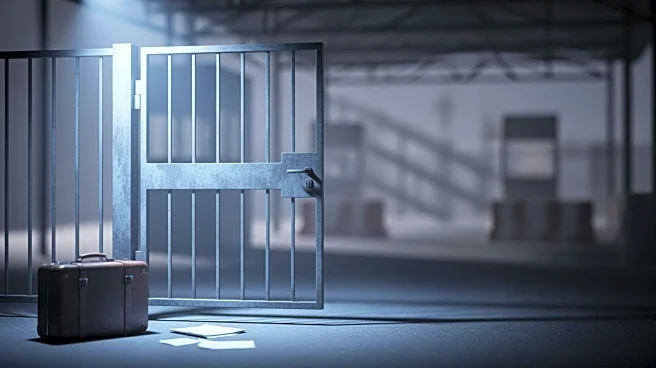What's Happening?
The U.S. Senate convened for a rare Sunday session as the government shutdown reached its 40th day. Senate Majority Leader John Thune indicated that a potential deal to end the shutdown was 'coming together,' although he cautioned that success was not
guaranteed. The shutdown has disrupted flights, threatened food assistance, and left federal workers unpaid. Republicans are working on a legislative package to reopen the government until January, while Democrats are pushing for an extension of subsidies for health plans under the Affordable Care Act. The proposal from moderate Democrats suggests ending the shutdown in exchange for a later vote on these subsidies. President Trump has expressed reluctance to compromise, urging Republicans to abolish Senate filibuster rules to advance legislation without Democratic support.
Why It's Important?
The prolonged government shutdown has significant implications for various sectors, including transportation, food security, and federal employment. The dispute over health subsidies is critical, as premiums for those enrolled in health exchanges could double next year if enhanced subsidies lapse. This situation places pressure on Democrats to secure a deal that extends these subsidies, impacting millions of Americans' healthcare costs. The shutdown also highlights the political divide, with President Trump advocating for the removal of filibuster rules to expedite legislative processes. The outcome of these negotiations could set precedents for future budgetary and healthcare policy decisions, affecting both political dynamics and public welfare.
What's Next?
A test vote on new legislation could occur in the coming days if Senate Majority Leader Thune decides to proceed. Democrats face a crucial decision: continue fighting for a meaningful extension of health subsidies, prolonging the shutdown, or vote to reopen the government with the hope of a future healthcare vote. The negotiations will determine whether the government can resume normal operations and if healthcare subsidies will be extended, impacting millions of Americans. The political maneuvering around the filibuster and healthcare subsidies will likely continue to be a focal point in the coming weeks.
Beyond the Headlines
The shutdown and subsidy debate underscore deeper issues in U.S. governance, such as the balance of power between political parties and the role of the filibuster in legislative processes. The situation raises ethical questions about the responsibility of lawmakers to ensure government functionality and protect public welfare. Long-term, the handling of this shutdown could influence voter perceptions and impact upcoming elections, shaping the political landscape and policy priorities.















